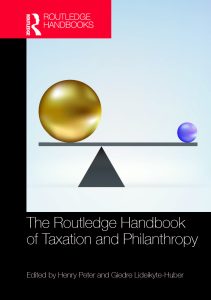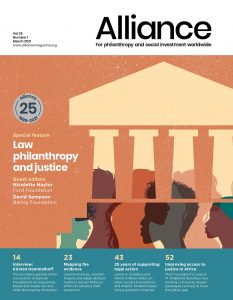Taxation of philanthropy is a heterogeneous topic that extends to multiple scientific disciplines. For academics and practitioners working in philanthropy, it is not uncommon to turn to branches such as philosophy, law, sociology, and economics to obtain thorough answers to the questions they encounter in their research and work.
 To date, however, there has been no comprehensive multidisciplinary analysis of the interaction between taxation and philanthropy. The Routledge Handbook of Taxation and Philanthropy provides the first comprehensive multidisciplinary analysis of the interaction between taxes and charitable giving. It seeks to answer complex academic and practical questions, as well as to foster further research and discussions in this field.
To date, however, there has been no comprehensive multidisciplinary analysis of the interaction between taxation and philanthropy. The Routledge Handbook of Taxation and Philanthropy provides the first comprehensive multidisciplinary analysis of the interaction between taxes and charitable giving. It seeks to answer complex academic and practical questions, as well as to foster further research and discussions in this field.
Included in the Handbook is the OECD report ‘Taxation and Philanthropy’, which was published in November 2020 in the context of the research project that led to this book. It was carried out as part of a collaboration between the OECD and the Geneva Centre for Philanthropy at the University of Geneva. The report contains the first in-depth comparative analysis of the legal norms and practices in the field, based on the data gathered through country questionnaires by the OECD from 40 OECD members and participating countries. The fundamental question of the report is as follows: how can governments design tax rules that support philanthropy in a manner that aligns with the public interest? An overview of related doctrine shows that striking the right balance can be difficult, as certain theoretical and practical difficulties exist with regard to the justification of such incentives. The Report however suggests that there are ways to save tax systems and allow governments to continue providing support to the philanthropic sector.
The Handbook is structured around four topics. The first part of the Handbook focuses on various aspects concerning the rationale and justification of tax incentives for philanthropy. The issue raises controversies: tax incentives for private philanthropy in fact amount to channelling public funds into support for private activities that have been decided and structured by bypassing democratic governance mechanisms. The fundamental questions are therefore: why would legislators delegate some of their budgetary prerogatives to private actors? How can one reconcile different views of what constitutes philanthropy activity? Can a clear distinction be drawn between philanthropic and political goals? This part of the book includes contributions ranging from a historical overview of the notion of philanthropy (Atkinson) to contemporary problems, such as distinguishing between charitable and political activities (Carmichael), passing through other domains, for instance, philosophical considerations attempting to explain in terms of maximizing utility theory the donor’s inherently costly choice to unilaterally transfer their financial resources, i.e. the so-called ‘gifting puzzle’ (Tieffenbach).
Cross-border giving in many instances still remains tax inefficient and more research could be carried out to offer theoretical as well as practical solutions to policymakers.
The second part of the Handbook, entitled ‘Taxes, efficiency, and donor behavior: theoretical and empirical insights’ ventures into the economic and technical aspects of tax incentives for philanthropy, analyzing the concept of efficiency as well as exploring and comparing various tax incentive models. As tax incentives for philanthropy diverge from the fundamental principle of the ability to pay, they should provide society with benefits that are larger than the concessions granted by the State to private philanthropic donors. This is however not always assessed and it is not uncommon for States to even be unclear about their objectives in this context.

For more on law and philanthropy, check out Alliance’s print issue on the subject.
The third part, entitled ‘Tax incentives for cross-border philanthropy’ deep dives into the under-researched area of transnational philanthropic giving and taxation. Some authors challenge the historical arguments still used to justify limiting tax exemptions to national borders, which are basically that if tax exemptions are justified by the positive impact this can only be in favour of the relevant countries own budget, on one hand, and that cross border philanthropic activities are more difficult to control and therefore subject to the misallocation of funds, on the other hand. Several contributors however show that there are feasible solutions to facilitate tax-advantageous cross-border giving, based for instance on potentially new double tax treaty provisions (Oberson) or more liberal national policies in this field (Silver).
The last part of the Handbook, entitled ‘Tax incentives for hybrid entities and social entrepreneurship’, explores the phenomena of corporate philanthropy and social entrepreneurship, inquiring among other things into the rationale of the traditional distinction between charity and business, which is increasingly blurred. Contributors to this section look at such topics as the distinction between donations and sponsorship (Hemels), the new entrepreneurial models of cultural organizations (Koolen-Maas/ van Teunenbroek/Bekkers) and how tax exemptions for social enterprises can coexist with competition laws (Gani).
Of course, more questions in the field remain unanswered than answered. For instance, little is known about the behaviour of corporations in the field of philanthropic giving, as empirical research in the field is scarce. Cross-border giving in many instances still remains tax inefficient and more research could be carried out to offer theoretical as well as practical solutions to policymakers. However, the studies in this field are increasing, and we are witnessing the establishment of a true ‘science of philanthropy’, which continues to develop. It is our hope that the present Handbook will contribute to this process.
Giedre Lideikyte Huber, PhD, is a Senior Lecturer at the Geneva Centre for Philanthropy, studying taxation of philanthropy, corporate tax and sustainability. Henry Peter is a professor at the Law School of the University of Geneva.
This article is based on LIDEIKYTE-HUBER Giedre/PETER Henry, Editors’ Introduction to the Volume, in The Routledge Handbook of Taxation and Philanthropy [Henry Peter; Giedre Lideikyte Huber, édit.], London (Routledge) 2021, p. 1-10.







Comments (0)